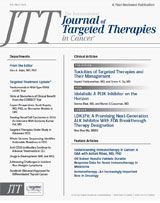Drugs in Development: NHL and MCL
Several oral drugs are in development for both non-Hodgkin lymphoma (NHL) and mantle cell lymphoma (MCL). “There is different activity in different lymphoma types with different oral drugs and antibodies in development,†said Andrew D. Zelenetz, MD, PhD.
Human lymphoma tumor cells in the pleural fluid stained with a Defquick stain and magnified to 400x. Included are 2 variations.
Source: Dr. Lance Liotta Laboratory, The Web site of the National Cancer Institute (http://www.cancer.gov)
Several oral drugs are in development for both non-Hodgkin lymphoma (NHL) and mantle cell lymphoma (MCL). “There is different activity in different lymphoma types with different oral drugs and antibodies in development,” said Andrew D. Zelenetz, MD, PhD, medical oncologist specializing in lymphoma at Memorial Sloan-Kettering Cancer Center in New York City. While lymphomas are relatively common cancers overall, development of new drugs is a challenge because each lymphoma subtype is different, essentially an orphan disease, said Zelenetz.
Following are some of the drugs in development for lymphoma:
Ibrutinib:An oral inhibitor of the Bruton’s tyrosine kinase (BTK), ibrutinib is approved as treatment for patients with mantle cell lymphoma (MCL) who have had at least one prior therapy. MCL, an aggressive subtype of NHL, has a poor prognosis. In a large, international, open-label, single-arm phase II trial in 115 patients, the estimated median progression-free survival (PFS) was 13.9 months.1The overall response rate (ORR) was 68% (75 patients); of these, 21% had complete response. Ibrutinib is currently being reviewed by the FDA for a potential indication in relapsed and/or refractory MCL based on these phase II results. Ibrutinib is a first-in-class BTK inhibitor and has a Breakthrough Therapy designation from the FDA for MCL and two other hematologic malignancies.
Idelalisib:An oral PI3K delta isoform inhibitor, idelalisib is in development for indolent NHL that is refractory to rituximab and alkylating-agent chemotherapy. The drug is also under review by the FDA for indolent NHL, as of September 11, 2013, based on an open-label, single-arm phase II trial in 125 patients. Interim results of the trial, presented at the International Conference on Malignant Lymphoma in Lugano, Switzerland, in June 2013, showed that patients treated with idelalisib had an ORR of 53.6% and a median PFS of 11.4 months.2Trials of idelalisib in combination with other therapies are ongoing.
IPI-145:IPI-145 is an oral inhibitor of both the delta and gamma isoforms of PI3K. A phase II trial in refractory indolent NHL is currently recruiting patients. Preliminary phase I data presented at the American Society of Clinical Oncology (ASCO) Annual Meeting in June 2013 showed a 68% ORR in 19 treated patients.3Four out of 6 patients with MCL also responded to the treatment.
ABT-199:A B-cell lymphoma (Bcl)-2 inhibitor, ABT-199 targets the apoptosis pathway, inhibiting the ability of cancer cells to survive. The drug is still in phase I, but so far appears active in MCL. Eight of 8 patients with MCL treated in the phase I trial achieved a partial response, with both complete and partial responses seen for other types of refractory NHL.4Of 29 patients treated, the ORR was 53%, with 1 complete response in a patient with diffuse large B-cell lymphoma. The results were presented at the ASCO 2013 Annual Meeting.
References
Obinutuzumab (GA101):A novel engineered antibody that targets the CD20 surface cell marker, obinutuzumab is being compared to rituximab, a currently approved anti- CD20 antibody. Positive phase III results in chronic lymphocytic leukemia were recently reported. The antibody is also being tested in two phase III trials for indolent NHL: in combination with chemotherapy in treatment-naïve indolent NHL and in combination with bendamustine in relapsed or refractory patients.5, 6
- Wang ML, Rule S, Martin P. Targeting BTK with ibrutinib in relapsed or refractory mantle-cell lymphoma.N Engl J Med. 2013,369:507-516.
- Salles, G. “Interim results from a phase 2 study of PI3K inhibitor idelalisib in patients with relapsed indolent non-Hodgkin lymphoma (iNHL) refractory to both rituximab and an alkylating agent” Presented at: 12th International Conference on Malignant Lymphoma; June 19-22, 2013. Abstract 064bis.
- Horwitz SM, Flinn I, Patel MR. Preliminary safety and efficacy of IPI-145, a potent inhibitor of phosphoinositide-3-kinase-δ,γ, in patients with relapsed/ refractory lymphoma.J Clin Oncol.2013;31(suppl; abstr 8518).
- Davids MS, Seymour JF, Gerecitano JF. Updated results of a phase I firstin- human study of the BCL-2 inhibitor ABT-199 (GDC-0199) in patients with relapsed/refractory non-Hodgkin lymphoma (NHL).J Clin Oncol. 2013;31(suppl; abstr 8520).
- A Study of Obinutuzumab (RO5072759) Plus Chemotherapy in Comparison With MabThera/Rituxan (Rituximab) Plus Chemotherapy Followed by GA101 or MabThera/Rituxan Maintenance in Patients With Untreated Advanced Indolent Non-Hodgkin’s Lymphoma (GALLIUM). NCT01332968.
- A Study to Investigate the Efficacy and Safety of Bendamustine Compared With Bendamustine+RO5072759 (GA101) in Patients With Rituximab-Refractory, Indolent Non-Hodgkin’s Lymphoma (GADOLIN). NCT01059630.

Examining the Non-Hodgkin Lymphoma Treatment Paradigm
July 15th 2022In season 3, episode 6 of Targeted Talks, Yazan Samhouri, MD, discusses the exciting new agents for the treatment of non-Hodgkin lymphoma, the clinical trials that support their use, and hopes for the future of treatment.
Listen